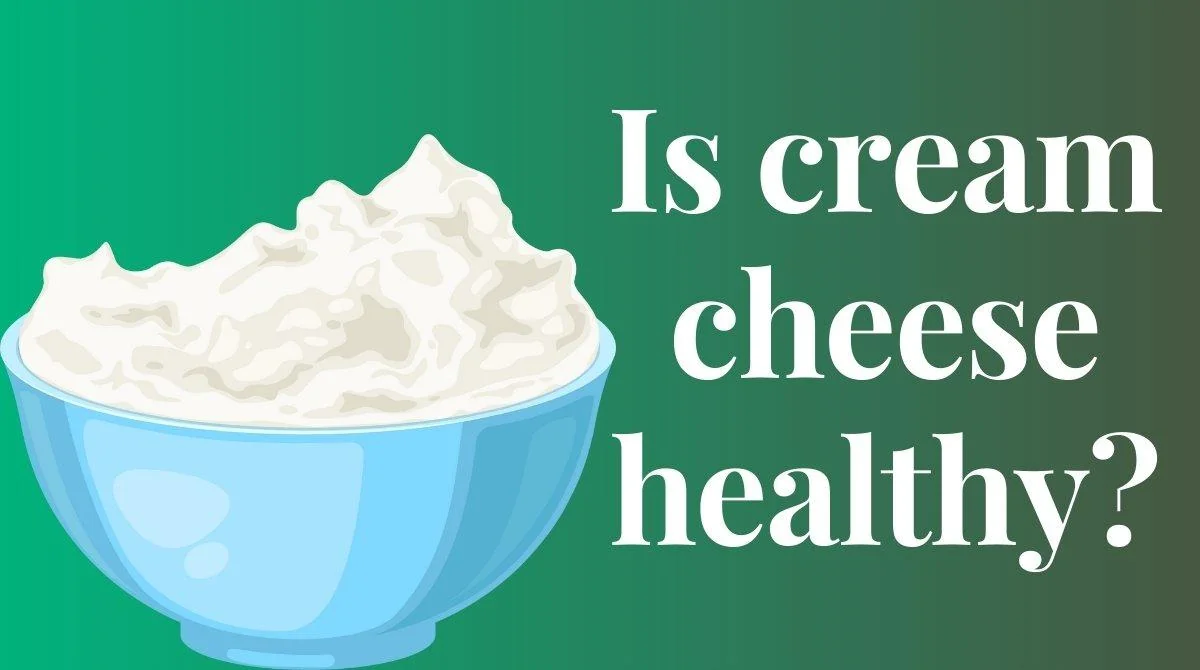People make cream cheese from milk, cream, and often stabilizers like guar gum, resulting in a smooth, creamy texture. Regular cream is available in both bar and whipped form. You can get it in the dairy section of most supermarket shops. The calories and fat content of cream will be affected by how you purchase it.
Table of Contents
ToggleCream Cheese Nutritional Information
The USDA provides nutritional information for a tablespoon (14.5g) of cream cheese.
- Fat: 5g
- Sodium: 46.5mg
- Calories: 50.8
- Fiber: 0g
- Sugars: 0.5g
- Carbohydrates: 0.8g
- Vitamin A: 44.7mcg
- Vitamin E: 0.1mg
- Choline: 3.9mg
- Protein: 0.9g
Carbohydrates
A serving of cream contains less than 1 gram of carbohydrates, primarily sugar. However, if you buy specific varieties of flavored cream cheese, the carbohydrate amount will rise.
Fats
The majority of the fat in cream is saturated fat. A single serving of cream cheese has 5 grams of total fat, including 5 grams of saturated fat. There is also a trace of polyunsaturated fat (0.2 grams) and monounsaturated fat (1.3 grams).
Protein
A single serving of cream cheese provides slightly less than one gram of protein.
Minerals and Vitamins
It contains some vitamins and minerals. One tablespoon of cream cheese provides 44.7 IU of vitamin A, 0.3 mcg of vitamin K, 1.3 mcg of folate, and 3.9 mg of choline. That includes calcium, phosphorus, magnesium, potassium, sodium, and trace selenium.
Cream Cheese Calories
One tablespoon (14.5g) of cream cheese has 50.8 calories, with 87% coming from fat, 7% from protein, and 6% from carbohydrates. Whipped cream is significantly lower in calories. Some manufacturers additionally include skim milk as an ingredient to reduce the fat content.
A 2-tablespoon serving of Philadelphia Whipped Cream Cheese contains 50 calories, 4.5 grams of fat, including 3 grams of saturated fat.
The number of calories in flavored cream varies depending on the type. Mixed berry or strawberry sweet cream flavors have more sugar and calories due to added fruit. Savory flavors like chive can increase sodium content due to extra salt, but typically don’t affect calorie count.
How much cream cheese is in one serving?
A single serving of cream typically equates to approximately one to two tablespoons. Popular brands such as Philadelphia include line marks on the package so you know exactly how much to consume per serving. According to the manufacturer, a single 1-ounce serving (about 2 teaspoons) contains 100 calories.

The Medical Advantages of Cream Cheese
It has little health benefits, and there has been little to no direct investigation into its possible benefits. A serving of cream is notably deficient in micronutrients.
Might Reduce Fat in Diet
It may be beneficial to certain people since it contains fewer calories and fat than butter. However, the difference is not significant, and it cannot replace butter in all cases. Low-fat cream cheese contains less saturated fat, a factor linked to a reduced risk of heart disease. To thicken meals such as soups and sauces, use low-fat cream cheese instead of flour or butter.
Sources of Vitamin A
While it does not contain large amounts of many minerals, it does contain a lot of vitamin A. Only one tablespoon contains 5% of your required daily amount, whereas a normal two-tablespoon dose contains 10%. Dairy is a strong source of vitamin A, and incorporating fat in a vitamin A-rich meal improves absorption. That includes both fat and vitamin A, making it an excellent source.
Vitamin A is crucial for a multitude of bodily functions, including vision, immune function, cell growth, communication, and reproduction. Your body cannot generate vitamin A, therefore you must acquire it through your diet or supplements. Primary sources come from animal products such as dairy.
Allergies
People with dairy or milk allergies should avoid this, which includes cow’s milk. Milk allergy symptoms range in severity from mild to severe, encompassing wheezing, vomiting, hives, and digestive disturbances. Milk can also trigger anaphylaxis.
People who are lactose intolerant may wish to avoid cream. Lactose intolerance causes symptoms such as nausea, cramps, gas, bloating, and diarrhea.
Cream Cheese Kinds
It comes in numerous kinds, including low-fat, flavored, and whipped. Neufchatel cheese, a comparable dairy product, contains one-third to one-half less fat than traditional varieties. A single 1 tablespoon serving contains 2.5 grams of fat and 1.5 grams of saturated fat.
Neufchatel cheese is manufactured from milk, whereas regular cream cheese is prepared from both milk and cream. If you want to reduce the amount of fat and calories in your meals, use Neufchatel cheese instead of cream cheese.
Food Safety and Storage
That should be properly packed and refrigerated. You can freeze it for use in recipes, but the texture will alter. They probably won’t want to spread it over toast or a bagel once it’s thawed.
How to Make Cream Cheese
When it is cold, it is difficult to work with recipes. To soften it, leave it on the counter for a brief period of time. If you don’t have time, you can soften the cheese by pressing it with a pastry roller or your palm.
When you enjoy it, you can find inventive ways to incorporate it into your healthy diet. You might be able to find Greek cheese at your local supermarket. This spread, made by brands such as Green Mountain Farm, contains more protein and less fat than standard varieties.
You can also use a light spread to keep the fat and calories under control. For example, if you often have a bagel with jam and cream cheese for morning, consider this healthy alternative: scoop out a bagel, apply a thin layer of whipped cream cheese, and top with fresh fruit. By replacing fresh fruit with jam, you will not only minimize fat, carbs, and calories, but also the quantity of sugar you ingest.




